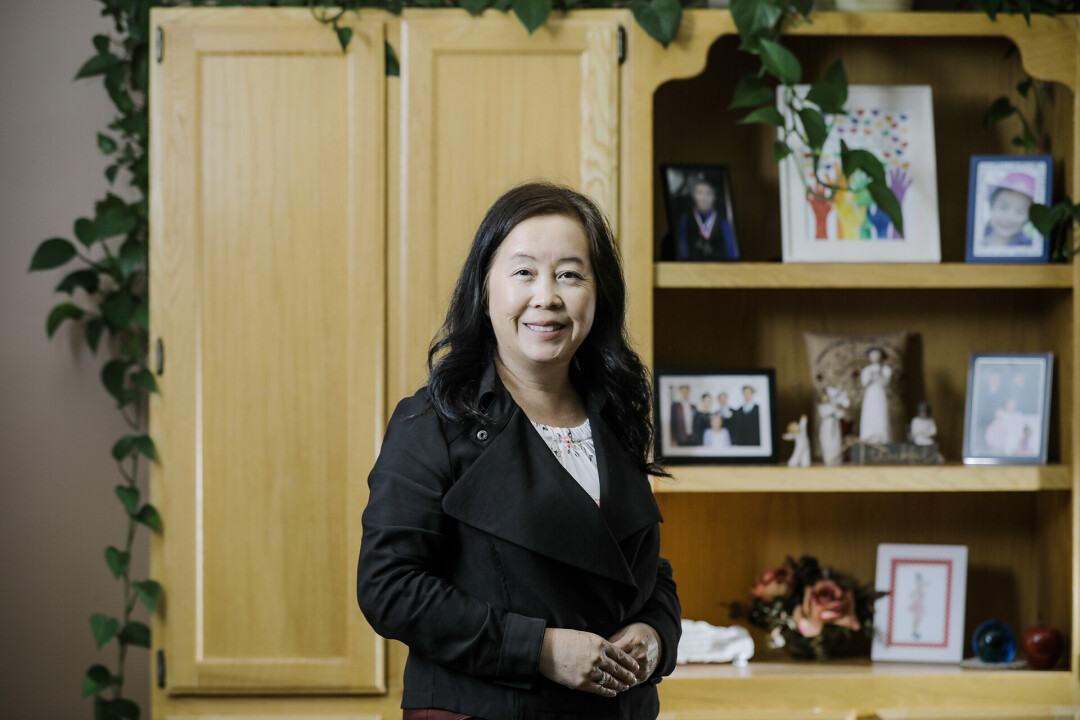Inspiring the Next Generation: First Hmong Principal in U.S. Works Beyond the Classroom
Kaying Xiong's passion for education and community goes beyond her work in the Eau Claire Area School District
Reonna Huettner, photos by Andrea Paulseth

At the height of the Vietnam war, a family of five fled from Long Tieng, Laos to Thailand in the middle of the night.
The father of the family, captain of the Royal Lao Army, fought for the U.S., and despite the difficult decision of leaving all they knew behind, he applied for asylum in the United States.
In June of 1978, the family made their way to Chicago, making history along the way.
Kaying Xiong was eight years old when she entered the Eau Claire Public School system, after moving from Chicago in 1981 to Eau Claire while her father sought an education at District One Technical Institute – now known as the Chippewa Valley Technical College – to pursue a higher-level career.
Immediately, Xiong and her family looked for ways to make connections, as there were very few Hmong families in the area when they first arrived in the states.
“Any Hmong family would provide comfort and provide a level of security that we were so yearning for," Xiong said, "because we didn’t have any other family."
As time went on, she continued getting an education through the ECASD, graduated from Memorial High School, and attended UW-Eau Claire for her teaching degree.
Throughout her educational experience, she and her siblings felt that school was a safe place and that they could trust the teachers who were taking time to listen to their needs outside of the classroom.
“They supported us socially and emotionally," Xiong said. "I was really connected with the school (and) it seems teaching was the natural path for me."
"I am just so passionate about making sure that we as adults are there for every child. And I mean every child."
After graduating from the university, she accepted a position as a first-grade teacher. Then, over time, she transitioned to a position as an English as a Second Language instructor while going back to school at UW-Superior for their Educational Administration program.
In 2001, Kaying Xiong made history by becoming the first Hmong principal in the U.S. at Locust Lane Elementary school – or at least, according to Xiong.
“Nobody has ever refuted and I never looked into it myself,” Xiong said with a smile.
While she was a principal, she went on to work on her doctorate degree in Educational Leadership through Hamline University and graduated in 2006.
Since then, Xiong is currently in a position at the district level as the Executive Director of Student Services, where she went from impacting 300 students in one building to impacting all 11,400 students in all 20 buildings run by the ECASD. Her goal now is to take all the moving pieces and provide the best possible services to keep students on track for the best educational experience possible.
“There’s a solution for every student, no matter where they're at academically, socially, emotionally, or behaviorally,” Xiong said. "We just need to figure out (that) solution."
And finding hat solution starts with leadership in the district.
Xiong expressed the importance of what that leadership looks like. As a woman of color, she believes her work will have an impact long after she steps away from her position. The footprint she leaves behind, she hopes, will continue to support students in their journeys – especially students of color and young women.
Xiong hopes to continue finding educational strategies that will work to support the social and emotional needs of all children throughout the district.
“We have a great academic system," Xiong said, "but if we aren’t there emotionally or socially, then they aren’t there for us to use the academic system."
Change, especially large change within an even larger system, takes time but she is excited and looks forward to watching it all unfold in the years to come.
“I feel like I am in a good place with the work that I do because I am just so passionate about making sure that we as adults are there for every child," she said, "and I mean every child."
Although she is unsure what the future holds, she hopes that no matter what happens, students feel impacted by their educational experiences.
“I feel that people who have really good experiences in the school district come back and share the experience with us, it’s rarely about what is learned but how the adults in their lives make them feel,” Xiong said.
Ultimately, what happens to children while in the district is what will shape them to become future citizens who will contribute to the world in the years to come, and the adults in the district have the chance to provide them with the best experience possible.
As Xiong said, change takes time, but it starts with this generation.


